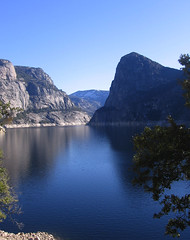PBS is airing all the episodes of Ken Burns’ opus online for the next few days. Watching the first two makes me wonder how John Muir did not simply go insane. Remember, he lived in the Bay Area. And those of you who’ve hiked the Santa Cruz mountains, try to imagine those wooded hills blasted by clear-cutting.
Here’s a guy who walked through Yosemite before commerce had a good crack at the place. At the end of his life, as development has seemed to have eaten up everything around him, the crowning indignity occurs: they put a dam in Hetch Hetchy Valley (a place so abundantly scenic that it’s still one of the prettiest places in America with a 35-fathom flood in the middle of it — if you leave the dam out of your snapshots).
Granted, Burns and company produced this series for full emotional impact. I can’t count the times I felt that dewy-eyed rush of emotion you get when reminded of the things you adore. And then I think of poor old Mr. Muir: he was about 100 times more fanatical about nature than I am. Must’ve said a lot of prayers.
Of course Muir had it easy compared to the folks our ancestors kicked off these lands. I’m not sure why I can never stop my brain from saying “fine, but what about those Indians we stole it from?” I know it’s an artifact of history, how things were done at one time, Manifest Destiny and all that. Like so many Americans I have a little bit of Indian blood in me, but not enough to explain why 100 years after the fact it still pisses me off. I get the same way when I think of all the people who got their last names from the white people who once owned them.
My excuse: if you’re going to hold your moral center together, some wrongs can’t be made right just because the central players have all died.
(OK, 14,947th digression complete.)
So, the merits of the series? Yes, it’s sappy and tear-jerking at times, but if you tune out the violins and tune in on the story, it is a fascinating portrayal of what happens when humans arrive at a new land that is essentially theirs for the taking. Those who went west had little more than their instincts to guide them. There wasn’t much of a historical template beyond the strong taking what they wanted from the weak. Most right-thinking people of their time saw a mountain range as a pain-in-the-ass impediment to their arriving in California early enough to avoid the Donner Party’s fate.
It only took about 40 years between the Gold Rush and the official closing of the frontier in about 1890 for people to start seriously pondering the logical outcome of paving everything for profit. People like Muir rhapsodized about the High Sierra in magazines read by Eastern elites, and pretty soon this word called “conservation” started showing up in polite conversations.
And so in effect it’s American history as if told by park rangers. You get many of the same players — presidents, pundits, controversies, etc. — but in the context of how their actions affected folks who enjoy walking in the woods. Makes it must viewing for folks of our ilk.


Another great post Tom. And this film has sure had an emotional impact on me. I’ve had to keep a box of kleenex handy while I’ve been watching it. I am sure glad for the passion of John Muir and the other people who acted to save those lands. Could you imagine what would have happened if Half Dome had a few tiny streaks of gold in it? Stupid greedy people would have blown it to smithereens. Weather permitting I will be driving through Yosemite next week and I am sure going to enjoy being there!
Muir’s and others initiatives also were timely supports for the challenges we faced up here in Canada… What we would have lost by not taking such steps…..
I remember something about a “life cycle” – kind of important for sustaining life I believe. The consuming of natural resources without allowing for replenishing (+ maturing) will gradually lead to our demise. A feeding frenzy of the almighty dollar by some wealthy individuals, after they acquire large land tracts then process and sell the goods, has caused an out-of-balance environment. The wealthy’s mind-set related to “. I don’t have any scientific evidence to suggest tampering with the basic building blocks of life will cause any harm, now or in the future” should be countered with replying to them “provide us with unquestionable scientific data to demonstrate that the intended
impact will definitely not cause any disruption in the life cycle”. Creation Care has not influenced our society enough to help change our behavior with our desire for consuming products at a rapid pace. Let the battles continue with this never ending war.